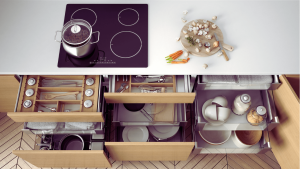Welcome to our article, where we explore the process of donating kitchen knives to Goodwill. It’s common to have kitchen utensils that are still in good condition but are no longer needed. Rather than throwing them away, donating to Goodwill can give them a new life and benefit the community. In this article, we will provide a definitive answer to the question, “Can you donate your kitchen knives to Goodwill?” and guide you through the steps of donating.
Key Takeaways
- Goodwill accepts a wide range of items as donations, including kitchen knives.
- Before donating, it’s important to assess the condition of your knives to ensure they are suitable for donation.
- Preparing your knives for donation involves cleaning and packaging them appropriately.
- If Goodwill does not accept your knife donation, other charitable organizations may welcome them.
- Kitchen knife donations can support those in need, generate positive change, and contribute to sustainability efforts.
Understanding Goodwill’s Donation Policy
Donating to Goodwill is a great way to support your community and declutter your home simultaneously. However, before you start gathering up items to donate, it’s important to understand Goodwill’s donation policy.
Goodwill accepts a wide range of items, including clothing, household goods, and electronics. However, there are some items that they do not accept, such as cribs, car seats, and recalled items. So, where do kitchen knives fall on this spectrum?
Understanding Goodwill’s Donation Policy on Kitchen Knives
Good news: kitchen knives are generally accepted as a donation item at Goodwill! However, there are some guidelines to keep in mind. Firstly, knives must be securely packaged to prevent potential injuries during transport or handling. Additionally, knives must be sharp and in good condition.
It’s important to note that some Goodwill locations may have specific policies regarding accepting knives, especially if they are larger or more expensive items. Check with your local Goodwill before making a knife donation to ensure they can accept the item.
| Accepted: | Kitchen knives in good condition and adequately packaged. |
|---|---|
| Not Accepted: | Kitchen knives that are dull, damaged, or improperly packaged. |
If you need clarification on whether your kitchen knives meet the donation criteria or have any questions about Goodwill’s donation policy, feel free to contact their customer service team for more information.
Assessing the Condition of Your Kitchen Knives
Before making a kitchen knife donation, it’s important to assess their condition to ensure they are safe and suitable for donation. Goodwill has specific guidelines on what types of knives they accept, so it’s best to familiarize yourself with them to avoid any issues.
Start by inspecting each knife individually. Look for any signs of wear and tear, such as chips or cracks in the blade, loose rivets or screws, or damage to the handle. If any knives have damage that affects their functionality or safety, they should not be donated.
Next, check for rust or corrosion on the blade. If the rust is minor, it can usually be removed with some steel wool or a rust eraser. However, if the rust is extensive, the knife may not be suitable for donation.
Additionally, ensure the knives are clean and free of food or debris. Wash them with warm soapy water and dry them thoroughly before donating. If any knives are too dirty or greasy, Goodwill may not accept them.
It’s worth noting that Goodwill and other charitable organizations may have different guidelines for knife donations, so it’s always best to check with the specific organization you plan to donate.
Preparing Your Kitchen Knives for Donation
Now that you’ve assessed your kitchen knives and determined they are suitable for donation, it’s time to prepare them for their new home. Ensuring they are clean and packaged correctly will make the donation process smoother and safer for everyone involved.
Clean your kitchen knives.
Before donating your kitchen knives, it’s essential to clean them thoroughly. Wash them with warm water and soap, then dry them with a towel. This step ensures the knives are free from any food particles or bacteria that could harm the next owner.
Package your kitchen knives
Another crucial step is packaging your kitchen knives. Wrap each knife separately in paper or a protective covering to prevent any damage or injury during transport. You can also use a knife sheath or blade guard if you have them. Place the knives in a sturdy box, and label the box “Kitchen Knives” or “Sharp Objects” to alert the donation center staff.
If you have a large collection of kitchen knives, consider bundling them together with rubber bands or ties to keep them organized. Remember to place any accompanying knife accessories in the box, such as sharpeners or blocks.
Check for specific requirements
Goodwill donation centers may have specific requirements for accepting kitchen knife donations. Be sure to check with your local center or their website to see if there are any restrictions or guidelines you should follow.
For example, some centers may only accept specific knives, such as chefs’ or paring knives. They may also require that the knives be in a particular condition or have an exact blade length. Always double-check to ensure clarity and satisfaction when donating your kitchen knives.
Following these steps, you can quickly and confidently donate your kitchen knives to Goodwill or another charitable organization. Your donation will help provide essential resources for those in need and contribute to a more sustainable future.
Where to Donate Kitchen Knives Besides Goodwill
If Goodwill does not accept kitchen knife donations, don’t worry. Other charitable organizations will gladly accept them. Here are some options to consider:
- The Salvation Army accepts kitchen knife donations and other household items. Visit their website to find a location near you.
- Habitat for Humanity Restores: This organization accepts gently used kitchen knives and other kitchen utensils and appliances. Check their website for donation guidelines and more information.
- Local Shelters and Food Banks: Many shelters and food banks accept kitchen knife donations to help individuals and families in need. Contact the ones in your area to see if they have specific guidelines or requirements.
Always check with the organization before donating to ensure they accept kitchen knives. And remember to properly assess and prepare your knives for donation to ensure they are in good condition and safe for others.
Benefits of Donating Kitchen Knives
Donating your kitchen knives to Goodwill or other charitable organizations can significantly impact both the donor and the community. Here are some benefits of making a kitchen knife donation:
| Benefits for Donors | Benefits for the Community |
|---|---|
| Decluttering: Donating kitchen knives allows you to declutter your kitchen and create more space for newer, more functional tools. | Supporting Those in Need: Your kitchen knife donation can provide essential resources for underserved individuals and families, especially those facing food insecurity or lacking access to essential household items. |
| Environmental Impact: By donating your kitchen knives instead of throwing them away, you contribute to sustainability efforts and reduce waste. | Generating Positive Change: Kitchen knife donations can catalyze positive change in local communities, helping to alleviate poverty, promote self-sufficiency, and improve quality of life. |
| Tax Deductions: Donating kitchen knives to a recognized charitable organization like Goodwill may qualify you for tax deductions. Make sure to keep a detailed record of your donation for tax purposes. | Creating Jobs: Your donation can help create job opportunities for individuals in your community. Goodwill, for example, uses the funds generated from donations to provide job training and employment services for people with disabilities or those facing barriers to employment. |
Not only can donating your kitchen knives benefit your own life, but it can also make a difference in the lives of those around you. Consider making a kitchen knife donation today.
Tips for Donating Kitchen Knives Responsibly
Donating kitchen knives can be a great way to support your community and reduce waste. However, ensuring that your donation is safe and responsible is important. Here are some tips to help you donate your kitchen knives successfully:
- Scrutinize your knives: Before donating your kitchen knives, ensure they are in good condition. Check for any cracks, chips, or other damage that could make them unsafe. Goodwill may not accept knives that are rusty, damaged, or dull.
- Clean and sanitize your knives: Before donating them, thoroughly clean them. Wash them with soap and warm water, dry them thoroughly, and then sanitize them with one tablespoon of bleach to one gallon of water. This will help prevent the spread of germs and bacteria.
- Package your knives safely: To prevent injuries during transport, package your knives carefully. Wrap each knife in paper or bubble wrap, and place them in a sturdy box. Label the box “Sharp Objects” to alert Goodwill staff to the contents.
- Follow Goodwill’s guidelines: Goodwill has specific guidelines for accepting donations, including kitchen knives. Make sure you follow their instructions carefully. If you are still determining whether your knives are acceptable, contact your local Goodwill donation center.
- Consider donating to other organizations: If Goodwill does not accept kitchen knives in your area, consider donating to other organizations that can use them. Check with local shelters, community centers, or food banks to see if they accept kitchen utensils.
Following these tips ensures that your kitchen knife donation is a safe and responsible way to support your community.
Donating Kitchen Knives: Frequently Asked Questions
Are knife donations tax-deductible?
Yes! Goodwill is a registered 501(c)(3) non-profit organization and donations made to us are tax-deductible to the extent allowed by law. Be sure to ask for a receipt when you drop off your items!
What types of kitchen knives does Goodwill accept?
Goodwill accepts most kitchen knives, including chef’s, paring, carving, and serrated knives. However, please note that Goodwill only accepts knives that are broken, dull, or missing handles.
Do I need to package my kitchen knives in a specific way?
While Goodwill does not require specific packaging for knife donations, we recommend wrapping them in the newspaper or bubble wrap for safety. You can also place them in a protective sleeve or sheath if you have one. Be sure to label the package as containing knives.
What if I’m concerned about liability issues?
As long as you donate knives in good condition and follow safe packaging procedures, you should not encounter any liability issues. However, we recommend reviewing your homeowner’s insurance policy or speaking with your insurance agent to ensure you are covered.
Can I donate my kitchen knives to other charitable organizations besides Goodwill?
Absolutely! If Goodwill does not accept kitchen knife donations in your area, many other charitable organizations and programs may welcome them. Some options include local homeless shelters, soup kitchens, and food banks.
What guidelines should I follow when donating specialty knives?
If you are donating specialty knives, such as sushi knives or meat cleavers, it’s best to contact Goodwill or the charitable organization first to ensure they can accept them. Some organizations may have special requirements or restrictions on certain types of knives.
If you have any other questions or concerns about donating kitchen knives, please don’t hesitate to contact us. We’re happy to help!
Finding Goodwill Donation Centers Near You
Suppose you’ve decided to donate your kitchen knives to Goodwill, knowing where your nearest donation center is important. Fortunately, there are several ways you can find the Goodwill donation center closest to you:
- Visit the Goodwill website and use their online store locator tool. Enter your zip code or city and state, and the tool will list nearby Goodwill locations.
- Download the Goodwill Locator app on your smartphone. This app allows you to search for nearby Goodwill stores and donation centers, get directions, and even schedule a pickup for more oversized items.
- Call Goodwill’s toll-free number at 1-800-741-0186 and ask for assistance locating your nearest donation center.
Before you drop off your kitchen knives, it’s always a good idea to call ahead and confirm the donation center’s hours and any specific guidelines they may have for knife donations. This will help ensure a smooth and hassle-free donation process.
Other Ways to Support Goodwill
Donating kitchen knives is a great way to support Goodwill’s mission, but it’s not the only way. There are many other ways to get involved and support the organization:
- Volunteer: Goodwill relies heavily on volunteers, so consider donating your time and skills to help with initiatives like job training, community events, and donation sorting. You can contact your local Goodwill to find out about volunteer opportunities.
- Donate money: Monetary donations help Goodwill provide services to even more people. You can donate directly through their website or at your local Goodwill store.
- Please spread the word: Help raise awareness about Goodwill’s mission by sharing their social media posts, telling your friends and family about the organization, or hosting a fundraiser to benefit Goodwill.
Remember, every little bit counts when positively impacting your community. By supporting Goodwill, you are helping to create opportunities and change lives for the better.
Sharing Your Donation Experience
Have you recently donated your kitchen knives to Goodwill or any other charitable organization? We would love to hear about your experience! Sharing stories can inspire others to take action and positively impact their communities.
Whether it was a straightforward process or had challenges, your donation experience is valuable. Did you learn anything new? Did it make you feel good knowing your donation could help someone in need?
By sharing your story, you can help raise awareness about the importance of donating and inspire others to follow in your footsteps. Small actions can create a ripple effect of Goodwill. Let’s make a difference together!
Facts and Statistics About Goodwill’s Impact
At Goodwill, we take pride in our mission to help individuals and families achieve their full potential through education, training, and employment services. Everyone deserves the opportunity to thrive, regardless of their background or circumstances.
Donating to Goodwill supports your local community and contributes to a larger movement toward sustainability and social responsibility. Here are some key facts and statistics that showcase the impact of Goodwill’s donations:
| Number of People Served Annually | More than 31 million |
|---|---|
| Number of Job Placements Annually | More than 300,000 |
| Total Revenues | $6.1 billion |
| Total Donations Processed Annually | More than 3 million tons |
These numbers speak to the scope and magnitude of Goodwill’s impact nationwide. We are committed to upholding our integrity, respect, and inclusiveness values as we build a more equitable society for all.
Together, we can make a difference and create a better future for future generations.
The Importance of Responsible Donations
At Goodwill, we value the safety and well-being of our donors, staff, and the community. That’s why responsible donations are crucial, especially when it comes to kitchen knife donations. Kitchen knives can be hazardous if not handled and prepared correctly. Therefore, we encourage our donors to always take the necessary precautions to ensure a safe and successful donation process.
When assessing the condition of your kitchen knives, check for any signs of damage, rust, or dullness. If the knives are severely damaged or unusable, it’s best not to donate them. Instead, dispose of them safely and responsibly to avoid any potential harm.
When preparing your kitchen knives for donation, ensure they are clean, dry, and packaged securely to avoid any potential injuries. Labeling the package as “sharp objects” is also a good practice to alert staff and volunteers of the package’s contents during the donation process.
We also urge our donors to be cautious when transporting their knife donations. Please place them in a secure location in your vehicle, such as the trunk, to avoid any potential accidents while driving.
Responsible donations go beyond the safety of our donors. They also help us maintain the quality of our inventory and ensure that our donations can benefit those in need. Your thoughtful donation practices can make a significant difference and help us continue our mission of changing lives through the power of work.
Supporting Your Community Through Donations
Donating your kitchen knives to Goodwill or other charitable organizations gives you the power to impact your community significantly. Your donation can provide crucial resources and opportunities to underserved individuals and families.
At Goodwill, your donations help fund job training programs, career services, and other community-building initiatives. By contributing to Goodwill’s mission, you directly support needy people and promote a more equitable society.
But the impact of kitchen knife donations goes beyond just Goodwill. Donating to other charitable organizations can support causes ranging from hunger relief to disaster response. Your donation may also help reduce waste by giving new life to items that would otherwise end up in landfills.
Donating kitchen knives is a simple yet powerful way to support your community. Whether you donate to Goodwill or another organization, your contribution can have a lasting impact on those in need.
The Future of Kitchen Knife Donations
As society evolves, so do our attitudes toward donations and charitable giving. With the rise of technology and increased awareness of sustainability, there is a growing need for innovation in donation practices. This is particularly true for knife donations requiring specific handling and safety measures.
One potential solution is using online tools and platforms to streamline the donation process. This could include digital tracking systems to ensure the safe transport and delivery of knife donations and online tutorials and resources to educate donors on proper knife handling and preparation.
In addition, there is a growing interest in upcycling and repurposing donated items, including kitchen knives. Donated knives could be used to create new products or repurpose for different uses, reducing waste and extending the lifeline of the donated knives.
Furthermore, partnerships between organizations could lead to more streamlined and efficient donation processes. For example, collaborations between Goodwill and knife manufacturers could lead to more sustainable production practices, with excess knives donated directly to Goodwill for redistribution.
Despite these potential advances, responsible donation practices must remain at the forefront of any innovation. Safety, transparency, and proper handling must always be prioritized to ensure knife donations’ continued success and positive impact.
Conclusion
After exploring the ins and outs of donating kitchen knives to Goodwill, it is possible. Goodwill accepts various donations, including kitchen utensils, and it’s a great way to support your community while decluttering your home.
Remember to assess the condition of your knives and follow the necessary preparation steps before making your donation. If Goodwill doesn’t accept knives in your area, other organizations might welcome them. And remember to share your donation experience and inspire others to do the same.
By making a responsible and altruistic donation, you can make a tangible difference in someone’s life and support Goodwill’s mission of creating job opportunities and community support programs. So, go ahead and donate your kitchen knives to Goodwill today!
FAQ
Q: Can I donate my kitchen knives to Goodwill?
A: Yes, you can donate your kitchen knives to Goodwill. They accept a wide range of items, including kitchen utensils, as long as they are in good condition and meet their donation guidelines.
Q: What is Goodwill’s donation policy?
A: Goodwill’s donation policy states that they accept items in good, usable condition. This includes kitchen knives as long as they are clean, sharp, and in working order. They also accept other kitchen utensils and household goods.
Q: How do I assess the condition of my kitchen knives for donation?
A: To assess the condition of your kitchen knives, check for any signs of damage, rust, or dullness. Goodwill generally accepts knives that are in good working condition and can be safely used by others.
Q: How do I prepare my kitchen knives for donation?
A: To prepare your kitchen knives for donation, clean them thoroughly, ensuring they are free of any food residue. Package them in a way that keeps them protected during transportation. Check with Goodwill for any specific requirements they may have.
Q: Where else can I donate kitchen knives besides Goodwill?
A: If Goodwill does not accept kitchen knife donations, there are other charitable organizations and programs that may welcome them. Some options include local shelters, community centers, and food banks.
Q: What are the benefits of donating kitchen knives?
A: Donating kitchen knives helps those in need and promotes sustainability and positive change in the community. It allows others to access essential kitchen tools and supports organizations that aim to uplift individuals and families.
Q: How can I donate kitchen knives responsibly?
A: To donate kitchen knives responsibly, ensure they are clean, safely packaged, and labeled if necessary. Take precautions to prevent any injuries during the donation process, and follow specific guidelines provided by the organization you donate to.
Q: Are there any frequently asked questions about donating kitchen knives?
A: Yes, there are frequently asked questions related to donating kitchen knives, such as tax deductions, liability concerns, and guidelines for different types of knives. For comprehensive answers to these questions, please refer to section 8.
Q: How do I find Goodwill donation centers near me?
A: To find Goodwill donation centers in your area, use their website’s locator tool, call their helpline, or check local directories. These resources will help you locate the nearest drop-off locations for your kitchen knife donation.
Q: What are some other ways to support Goodwill?
A: Besides kitchen knife donations, you can support Goodwill by volunteering your time, making monetary donations, and spreading awareness about their mission. These actions contribute to the positive impact Goodwill has on communities.
Q: Can I share my donation experience with Goodwill?
A: Absolutely! Sharing your donation experience with Goodwill, primarily related to kitchen knife donations, can inspire others to make a difference. By sharing your story, you can help create a ripple effect of Goodwill and encourage others to take action.
Q: What are some facts and statistics about the impact of Goodwill’s donations?
A: Goodwill’s donations have a significant impact on communities. They provide needy individuals with job training, employment opportunities, and essential resources. For interesting facts and statistics about Goodwill’s impact, please refer to section 12.
Q: Why is responsible donation important, especially for kitchen knives?
A: Responsible donation is crucial, especially for kitchen knives, to ensure the safety of others. Improperly handled knives can pose risks, and thoughtful donation practices help mitigate these risks and contribute to the community’s overall well-being.
Q: How does donating kitchen knives support the community?
A: Donating kitchen knives supports the community by providing essential resources to those in need. Access to well-functioning kitchen tools enables individuals and families to prepare meals, fostering self-sufficiency and enhancing their quality of life.
Q: What does the future hold for kitchen knife donations?
A: The future of kitchen knife donations holds potential for growth and innovation. Emerging trends and technological advancements may enhance the donation process, addressing challenges and facilitating a more significant impact on communities.

It’s me, Amber Hayden, the heart and soul behind SagarmathaOnlineMedia.com. From a young age, I’ve been head over heels for everything home-related, from interior decor to gardening. I’m the type who can’t resist a well-crafted piece of furniture, and I firmly believe that a home isn’t complete without a pet or two. But it’s not just about creating pretty spaces for me. I’m all about making homes that tell a story reflecting the people living there. SagarmathaOnlineMedia.com is my way of sharing this passion with you. Whether you’re looking for tips to jazz up your living room, advice on pet care, or ideas to make your garden bloom, I’m here to help. So, let’s embark on this journey together and make your house a home!



